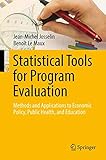Statistical tools for program evaluation : [electronic resource] methods and applications to economic policy, public health, and education / Jean-Michel Josselin; Benoît Le Maux.
Material type: TextPublication details: Cham, Switzerland : Springer, 2017.Description: 1 online resource (x, 531 pages) : illustrationsISBN:
TextPublication details: Cham, Switzerland : Springer, 2017.Description: 1 online resource (x, 531 pages) : illustrationsISBN: - 9783319528274
| Item type | Current library | Call number | Status | Date due | Barcode | |
|---|---|---|---|---|---|---|
| E-Resources | Main Library E-Resources | 361.6 J84 (Browse shelf(Opens below)) | Available | E004591 |
Browsing Main Library shelves, Shelving location: E-Resources Close shelf browser (Hides shelf browser)
Statistical tools for program evaluation: introduction and overview -- Part I. Identifying the context of the program -- Sampling and construction of variables -- Descriptive statistics and interval estimation -- Measuring and visualizing associations -- Econometric analysis -- Estimation of welfare changes -- Part II. Ex ante evaluation -- Financial appraisal -- Budget impact analysis -- Cost benefit analysis -- Cost effectiveness analysis -- Multi-criteria decision analysis -- Part III. Ex post evaluation -- Project follow-up by benchmarking -- Randomized controlled experiments -- Quasi-experiments.
This book provides a self-contained presentation of the statistical tools required for evaluating public programs, as advocated by many governments, the World Bank, the European Union, and the Organization for Economic Cooperation and Development. After introducing the methodological framework of program evaluation, the first chapters are devoted to the collection, elementary description and multivariate analysis of data as well as the estimation of welfare changes. The book then successively presents the tools of ex-ante methods (financial analysis, budget planning, cost-benefit, cost-effectiveness and multi-criteria evaluation) and ex-post methods (benchmarking, experimental and quasi-experimental evaluation). The step-by-step approach and the systematic use of numerical illustrations equip readers to handle the statistics of program evaluation. It not only offers practitioners from public administrations, consultancy firms and nongovernmental organizations the basic tools and advanced techniques used in program assessment, it is also suitable for executive management training, upper undergraduate and graduate courses, as well as for self-study.
There are no comments on this title.








